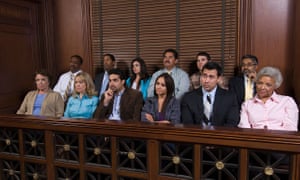Jury Selection in Criminal Trials
Jury Selection (Voir Dior) in Criminal Trials – When most people think about getting charged with a crime, they envision a trial, but that rarely happens. Most criminal cases that are not dismissed end with some sort plea being taken by the defendant. A defendant however, does not have to take any plea they he is uncomfortable with, and in that case, there is a trial.
In the criminal justice system in the United States, according to the sixth amendment, those who are charged with a crime have the right to be tried by a jury of their peers. Juries serve a very important purpose as they are deciding the facts of the case. In this blog, we will explain a little bit about how a jury works.
This is for informational purposes only, and is not intended to serve as a substitute for the advice of a criminal defense lawyer.
The function of the jury in a criminal trial
In a criminal trial, the law is decided by the judge. This means the judge decides what evidence is admissible, what motions should be granted, and what objections should be sustained or overruled. The role of the jury however, is the decision making regarding the facts.
The jury hears evidence and they become the “finders of fact”. This means that they, and they alone, get to decide what really happened. This empowers them to make the decision of whether or not the government met its burden of proving the defendant guilty beyond a reasonable doubt.
What makes a good jury?
The government and the defense may have different opinions on what constitutes a good jury, for obvious reasons. In truth, however, a good jury is one that can be fair and impartial and consider all the facts that are presented to them.
A good jury must also be able to properly apply the law and understand the presumption of innocence. Good jurors are thoughtful, they pay attention, and they refrain from making up their minds until all the evidence has been presented.
Jury Selection in North Carolina Criminal Cases
In North Carolina, jury selection is done primarily by the attorneys on the case. Each side (prosecution and defense) is allowed to ask questions of each potential juror. There are pre-emptory strikes and for cause strikes.
Pre-emptory strikes are strikes that don’t have to be explained. They can be used at the discretion of the parties, within certain legal limits. Generally, each side has six preemptory strikes and may strike a juror for almost any reason (as long as it is not on the basis of a protected class such as race or gender).
For cause strikes are strikes that can be made for cause, when a potential juror show bias or inability to be fair and impartial. Each side has an unlimited number of for cause strikes.
Jury Selection in South Carolina Criminal Cases
Jury selection in South Carolina criminal cases is primarily done by the judge. The attorneys can submit certain questions beforehand that the judge may or may not ask the jury pool.
Jury Selection in Federal Court Criminal Cases
Jury selection in Federal criminal cases is primarily done by the judge. The attorneys can submit certain questions beforehand that the judge may or may not ask the jury pool.
Additionally, the judge may allow some time for the attorneys to question potential jurors.
If you have been charged with a crime, contact us. Criminal defense can be a complicated matter and people without training and expertise should not attempt to handle it themselves.
